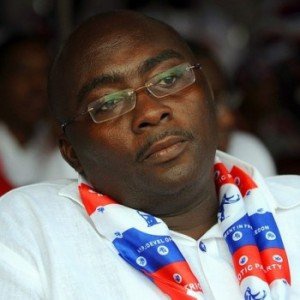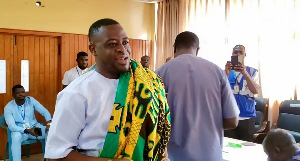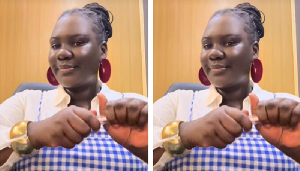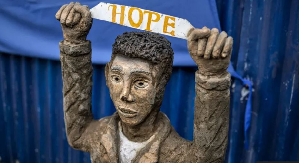Dr Mahamudu Bawumia, the second petitioner on Tuesday raised doubts about a letter tendered by Mr Tsatsu Tsikata, Counsel for NDC purported to have been written and signed by Nana Akufo-Addo, the first petitioner in the ongoing election petition hearing.
Dr Bawumia said though the signature and letter head appeared to be that of the first petitioner, it was curious that a letter written on December 5, 2012 would be received by the Electoral Commission (EC) on December 3, 2012.
He raised the suspicion when Mr Tsatsu Tsikata, Counsel for the National Democratic Congress (NDC) continued his cross-examination of the witness on the ninth day of the hearing.
Dr Bawumia said there was inconsistency with the date on the letter received by the returning officers and that the petitioners had asked the EC to explain the contradiction.
He said he was not initially aware of the presence of the letter, but his attention was later drawn to it, adding that there was something interesting about the letter.
Earlier, Mr Tsikata asked the witness whether CI 75 provided for what happened when there was a breakdown of the verification machine. Dr Bawumia answered and said he was aware that when a machine breaks down, voting must stop, and the machine replaced.
Mr Tsikata also asked if the “no verification no vote” saying by the witness and the petitioners meant that people should not be allowed to vote if their hands had not been passed through the verification machine. He added that there were several other processes of verifying a voter, so the understanding of the law by the witness was flawed.
Dr Bawumia said per the instruction by the EC, which had been clearly emphasized in the CI 75, one would have to pass through all the processes of verification, including biometric verification before voting.
He named two polling stations in the northern region where the entire results were annulled because two people did not go through the process of biometric verification.
Dr Bawumia further explained by saying that even by law, disabled persons still have to be biometrically verified.
Mr Tsikata asked the witness if the terms of reference of the committee set up to investigate the alleged irregularities were to ensure that the first petitioner becomes the president.
Dr Bawumia said the committee was to ensure that there was justice to all Ghanaians.
Mr Tsikata asked again if it were the wish of the committee members to make the first petitioner president, and he Dr Bawumia the vice president.
Dr Bawumia said he did not ask members of the committee whether it was their wish to make Nana Addo president and him the vice president.
Mr Tsikata also asked the witness that as the chairman of the committee, did he give directive to his members to pick out everything in C3 and use that as evidence of irregularity. He further asked how the witness came about with irregularities on the alleged duplication of serial numbers.
Dr Bawumia said they had knowledge on the various irregularities, and so they coded the irregularities and the computer did the rest.
Mr Tsikata picked another set of pink sheet exhibits for further cross-examination, and said there were no exhibit numbers, and asked the witness if it was a mistake on the part of the petitioners.
Dr Bawumia conceded but said it might be a problem for the commissioner of oath.
Mr Tsikata said it may well be an error and that human beings are fallible.
Dr Bawumia insisted that though human beings could make mistakes, that was different from violations of the law.
Tsikata also presented to the court several other pink sheet exhibits in which some spaces for exhibit numbers have been left blank, others have been filled; some left unstamped by the commissioner of oath. He then asked Dr Bawumia what accounted for the anomaly.
Dr Bawumia said the exhibit numbers were generated electronically and manually, adding that those that have not been labeled and unstamped were supposed to have been done by the commissioner of oath.
Mr Tsikata further presented a list of pink sheet exhibits for the witness to check and to confirm if they were mislabeled.
Dr Bawumia confirmed they were mislabeled but insisted that they were entered once in their analysis of evidence.
After an hour recess, Mr Tsikata continued with his cross examination and brought out a new set of pink sheet exhibits and asked the witness if he could confirm that two of the pink sheets were from the same polling station.
Dr Bawumia confirmed they were separate pink sheets from the same polling station.
Mr Tsikata asked the witness if it is a mistake that the exhibits did not have the stamp of the commissioner of oath.
Dr Bawumia said if that is what was supposed to happen then it was a mistake.
Mr Tsikata then asked if any of the petitioners was present when the commissioner of oath was packaging the exhibits and whether or not they saw all the exhibits being tendered.
Dr Bawumia said the other two petitioners were not present when the exhibits were being packed by the Commissioner of Oath but insisted they had looked through every single pink sheet before they were tendered.
Mr Tsikata also asked the witness if he admitted that there was an error in not filling the space for the labeling of pink sheets exhibits.
Dr Bawumia admitted it was an error but ironically said those errors must not affect "somebody's presidency."
Mr Tsikata presented another list of pink sheet exhibits to be checked by the witness.
At that juncture, Mr Philip Addison, Counsel for the petitioners raised an objection and said the exhibit being tendered by the counsel of the third respondent was struck out in the amended petition and so counsel could not ask the witness questions on exhibits that were no longer before the court.
Mr Justice William Atuguba, the presiding judge, upheld the objection and asked Mr Tsikata to find other ways to continue his cross-examination.
Case adjourned to the Thursday May 2, 2013.
General News of Wednesday, 1 May 2013
Source: GNA













